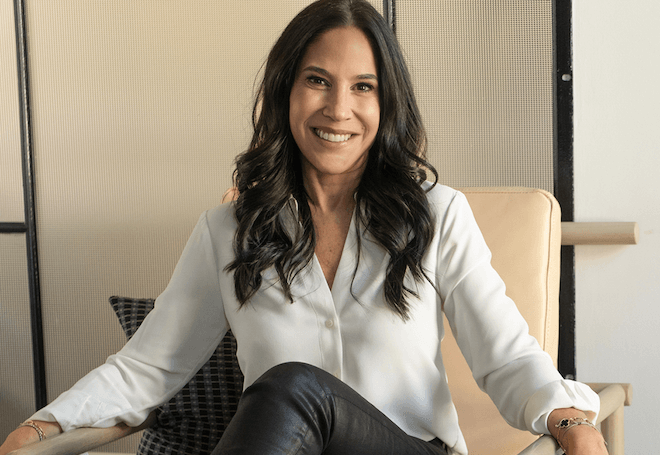If you clicked on the link to this story, the 2024 election likely has you feeling somewhere between fricasseed and fried. You’re not alone. And there’s something you can do about it, thanks to clinical psychologist, anti-anxiety influencer and author (and narcissism expert and podcaster) Dr. Jaime Zuckerman. The Ardmore doc — ”Dr. Z” — has seen an influx of patients seeking help handling this fraught political moment.
First, Zuckerman’s bad news. Election anxiety is inescapable. “It’s everywhere,” she says. Second, her better news: Anxiety isn’t all bad. “I tell people that it’s normal to feel anxiety. It just means you care,” she says. “A moderate amount of anxiety is healthy. It motivates us, motivates people to get out and vote.”

But when anxiety interferes with your normal life, consumes your thoughts, disrupts your sleep, interrupts your work, affects your ability to spend time with friends, family and coworkers, or, more generally, impedes “your ability to function throughout the day,” Zuckerman says, you must make a concerted effort to manage it.
Here are a dozen simple tips — No pressure to adopt them all; just one or two will help — to help you tamp down the nerves in both the run-up to and aftermath of November 5.
(Some of these quotes have been condensed for brevity.)
Consume news just twice daily. That’s two times.
Why: “If you find yourself overdoing research, that can sometimes act as an avoidance strategy. Trying to get too much information takes you out of the present moment and doesn’t let you just sit with it, because you’re constantly trying to find more and more and more and more.”
It’s always healthier to deal with a problem rather than to distract yourself from it.
What to do: “Pick two news sources — make sure they’re credible — one that’s more national, and one that’s local. Check in on these sources twice a day only, so once in the morning, then once later in the day — but never before bed.”
Make going on the gram / X / TikTok a little harder for yourself.
Why: Like a lot of bad habits, mindless scrolling is not something you can stop doing by just telling yourself to. You need to add roadblocks. Making small changes can help turn off your reflexive social media auto pilot. Says Zuckerman, “Anything you need to do that’s extra, changes up that reinforcement schedule.”
What to do: Dr. Z recommends checking your feeds “one or twice a day.” Sound impossible? Here’s some ways to at least reduce social media screen time.
Block accounts. The ones that make your blood boil, for example. But also the ones that just clutter up your feed. Think: You are Marie Kondo. If your brother-in-law’s boat parade videos fail to spark joy, block away. (“You can always unblock them” later, Zuckerman says.)
Turn off alerts. Do you really need to know every time someone likes your post? Maybe, but you can wait until after dinner to reap that vital information. Do this in your settings.
Move your social media apps to the very last home screen. “If it’s not on your home screen,” she says, it’s just a little more difficult to fall prey to a social media vortex. If you’ve ever opened your phone to send a text and suddenly found yourself on TikTok instead, you know the blackhole is real.
Delete your social media apps. Not permanently, you goober (as if you could permanently delete anything off the internet). Just delete the icons on your phone for a few hours at a time. Scroll your IG in the morning, delete the icon, and re-download in the evening. It’s easier and quicker than you think.
First, Zuckerman’s bad news. Election anxiety is inescapable. “It’s everywhere,” she says. Second, her better news: Anxiety isn’t all bad.
Prepare yourself for an uncomfortable long haul.
Why: Falling into the at-least-it’ll-all-be-over-by-November 6 is a recipe for more anxiety.
What to do: “Look for things that you can control to limit anxiety and uncertainty,” Zuckerman says. “What are the things that you can control?”
“You can control whom you talk to about it … Look for people that hold similar views to yours. Limit who you’re associating with for a certain period of time to reduce arguing, to reduce the drama, — even if it’s a family member.”
“Do something for someone else. Volunteer. This makes you feel good about yourself. It doesn’t have to be something political. Donate to a certain charity. Go to your kids’ school and help out … Volunteering gives you a sense of control and a sense of community.”
Move to Canada. We joke, but honestly, it’s something you could arguably control, she says. (Montréal is lovely this time of year.)
Practice … talking.
Why: With the election here and the winter holidays coming, it’s smart to get ready for more than just meals, parties and gifts. You need to get ready for … conversation, which threatens to ruin all the rest of your plans.
What to do: “Come up with a mantra ahead of time, a template statement that you can use to get yourself out of the conversation. Something like, ‘I’m so overwhelmed with this. I can’t talk about it anymore. I’m sure you can understand,’” says Zuckerman. “If they’re insisting, it’s important you repeat your mantra, word for word.”
“I always like to throw in at the end, ‘I’m sure you can understand,’ because I always feel like” What’s somebody going to say, ‘No, I don’t understand why you don’t want to talk about politics?’”
Agree to disagree.
Why: Some people will not understand, however. No matter if you’re enjoying a family dinner, waiting in line at the supermarket, standing on the sidelines of your kid’s football game, they’ll persist.
What to do: Stay calm. Use neutral words and as-brief-as-possible responses. Also, says Zuckerman, “Don’t be scared to say, ‘We’re just going to have to agree to disagree.’”
Want more prep? “Find someone you’re really comfortable with, and role play,” she says. “We do this in therapy all the time. You can practice body language, facial expressions, tone of voice” and those aforementioned mantras. Sounds a bit goofy, but could save you from obsessing in the aftermath of an unwanted interaction.
If this is happening via text or DM, your easiest option is to just not respond. If you must, you can write back, “I’m not talking about this right now,” or, “I love you, but it’s not the time.”
Remember: Anxiety is normal.
Why: Believing you’re the only one stressing about this just stresses you out more.
What to do: Be kind to yourself. Embrace your people. Go to therapy; it’s like a gym for your mind. “We’re all at our wits’ ends,” says Zuckerman. “This is a big election. This is a big deal. The results mean a lot of things to a lot of people. It would be weird if people weren’t worried, and it would be weird if people weren’t anxious.”
All that means is that you care about your family and your country. And I don’t think that that’s a bad thing at all.”
![]() MORE ELECTION COVERAGE FROM THE CITIZEN
MORE ELECTION COVERAGE FROM THE CITIZEN




